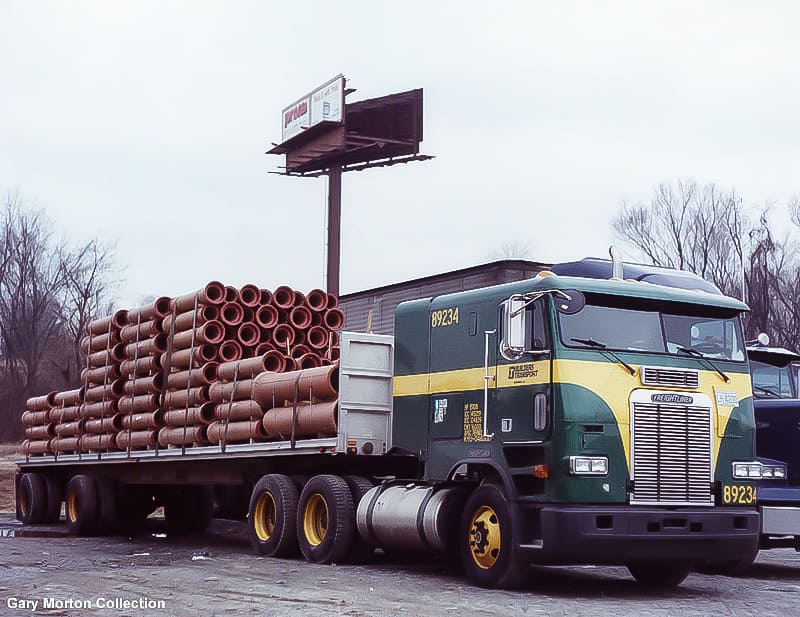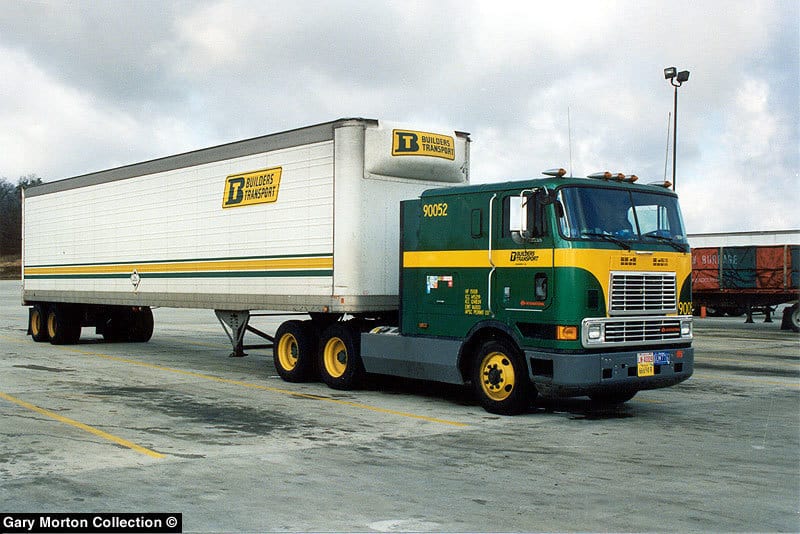
Located in Camden, South Carolina, Builders Transport Inc. was founded by Charles Gay, Sr. in 1962. No stranger to the trucking business, Gay had founded an earlier endeavor, the Gay Trucking Company, in 1945. That first company started much smaller, with just one tractor and two trailers, primarily hauling cottonseed.
Builders Transport, however, grew much larger. At one point in its history, it was the second-largest truckload carrier in the nation, with approximately 3,500 tractors and 9,000 van and flatbed trailers.
While deregulation had eviscerated other trucking companies, Builders Transport flourished in the climate they left behind. The company made its reputation hauling textiles, paper products, tires, metal, chemicals and building products. In 1984, Builders Transport turned a $7.6 million profit on revenue of $102.4 million. The following year, the company was named one of the top 100 “Little Growth Companies in America” by BusinessWeek magazine after a 356% leap in profits and a 22% gain in sales. The 1980s continued to be profitable for the company, with the company reporting net income of $5.4 million in 1986 and $6.4 million in 1987. The company operated 2,500 trucks in 35 terminals at this time. In 1989, it employed 3,800 people.
However, Builders Transport began reporting substantial financial losses in the late 1980s and early 1990s. In 1993 the company reported its first profit in over five years. The company let go of its unprofitable business and terminals and reported revenues of $250 million in 1994. Just three years later (1997), however, the company reported a $50.5 million loss on $288.1 million in revenue. At this time, the company was nearing $116.5 million in debt. Despite further attempts at reorganization, Builders Transport filed for bankruptcy in May 1998. In July, Schneider National (NYSE: SNDR) announced its intent to purchase the company. The acquisition allowed 1,950 of Builder Transport’s drivers to keep their positions, but the company name was lost, absorbed in the larger trucking giant.

Quick summary of Builders Transport post-deregulation:
Named to Top 100 “little growth” companies in America” in 1985 after a 356% leap in profits, 22% gain in sales. In 1984, turned a $7.6 million profit on sales of $102.4 million. (The Greenville News – May 28, 1985)
1986 – reported 3rd quarter income of $652,000 compared to $2.5 million in 1985. Acquired Jay Lines Inc, of Dallas
Net income in 1987 totaled $6.4 million; totaled $5.4 million in 1986
Reported a net loss in 1988 of $611,500
3,800 employees in 1989; as well as 35 terminals and 2,500 trucks
1989 – rejected merger offer from Two Trees, Inc. of $54 million, established a company stock program to offset its $15 million in debt
1991 – attempted to recover from financial distress by dropping unprofitable lines such as its refrigerated business and closed several terminals. Company profits were damaged by the Persian Gulf War
1993 – turned its first profit in over five years
1994 – revenues exceeded $250 million
Filed for Chapter 11 in May 1998 and merger with Schneider National (NYSE: SNDR) was announced in July.








Ronald Padilla
I entered the trucking industry just prior to the victims of deregulation, I was fresh out of the Army in 75 and started driving in 76 and in 78 started driving for Delta Truck lines and was a member of line haul local 224. It was a great job till the original family founders sold out, it went down hill from there! I remained a driver till 87 at Milne Truck lines running L. A. Denver as sleeper teams. The industry has done nothing but go down hill since then and have seen it from both driver and management side!
Mike Pipia
I grew up the same way as you a son of a trucker. We did the same thing on vacation or just weekend road trips. He was a Teamster 299 and proud to be. He took us on many trips in his rig. As a very young kid met Jimmy Hoffa at the union hall. He thought my brother and I the same thing about trucks and trailers, laws, rules and yes the people. I was proud of my Father who had friends all over.
Truck driver
They moved to Mexico with Burlington motor carriers. I seen their trailers with Mexico plates dropped at Donaldson plant between Indianapolis and Chicago at that crazy D’s truck stop exit east . 1 exit North of the petro
Michelle
I was with Schneider when the purchase happened. In a smart move Schneider bid twice, two highest bids. They aquired Builders for the lowest of the 2 , which was what just what 2 of the half dozen or so terminals builders had was worth. Schneider had no real use for the client list, given Builders was primarily flatbed. Most of builders tractors were leased, what they had that Schneider did want and need was nearly 2,000 already qualified experienced drivers and owned terminals, one of which is the current location of Schneider terminal in Dallas.
k woodward
Yes.. the terminal in Houston was one big improvement over the old Schneider terminal just a few miles away. I drove for Builders when the Dallas terminal was built. They had contracts to haul Proctor and Gamble products in Dallas. Only half the fleet hauled flat bed. That’s where I worked. They had a Dedicated to Lowes division. Refrigerated which they sold about the time they closed the Houston terminal I worked at.. they also had a van division that was third behind Schneider and JB Hunt. Basically they went out of business from growing too rapidly and bad management decisions…they should have merged with Gulf Coast when they had the chance. It was all over the company we were merging but I never heard why it never happened.
Patrick Griffus
Deregulation ripped every trucking company to the bone. Corporate America passed the cost of transportation to the worker.
I was lucky enough to work for union carriers. I got a pension after working for 5 different carriers. Consolidated freightways was a good company. It closed its doors on labor day 2002. The creators of freightliner. They stripped it to nothing, complete with golden parachutes.
Today its non union Conway. I really dislike wallstreet
Henry Wallis
Thank Jimmy Carter for the demorats killing the trucking industry. I drove over 3 million miles. I’ve seen it going down hill.
Tim Cornell
Yeah, greedy teamsters and bad business decisions had nothing to do with it.
J.R. Patton
A very intelligent comment from Avery intelligent person.